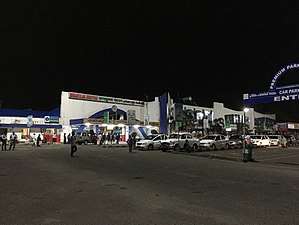Ernakulam Junction railway station
Ernakulam Junction | |
|---|---|
| Express train and Passenger train station | |
 | |
| Other names | Ernakulam South |
| Location | Kochi, Kerala, India |
| Coordinates | 9°58′08″N 76°17′30″E / 9.96885°N 76.29160°ECoordinates: 9°58′08″N 76°17′30″E / 9.96885°N 76.29160°E |
| Owned by | Indian Railways |
| Operated by | Southern Railway zone |
| Line(s) |
Ernakulam–Kottayam–Kayamkulam line, Ernakulam-Shoranur Ernakulam-Alappuzha-Kayamkulam Ernakulam Junction-Cochin Harbour Terminus |
| Platforms | 6 |
| Tracks | 12 |
| Construction | |
| Parking | Available |
| Bicycle facilities | available |
| Disabled access |
|
| Other information | |
| Station code | ERS |
| Fare zone | Southern Railway zone |
| Classification | A1 Class |
| History | |
| Opened | 1932 |
| Rebuilt | 1946 |
| Electrified | 2000 |
| Traffic | |
| Passengers (2017-18) |
28,170 per day[1] Annual passenger - 1,02,82,088 |
| Rank |
2 (in Kerala) 2 (in Trivandrum division) |
Ernakulam Junction railway station (also known as Ernakulam South, code: ERS) is the biggest railway station in the city of Kochi in Kerala, India. Controlling 376 train routes at a time, it is the busiest railway junction station in South India.[2] At ₹158 crore (equivalent to ₹162 crore or US$23 million in 2017), it is the second largest in terms of passenger revenues in Kerala and the fifth largest in Southern Railway.[3] It is an A1 classified station operated by the Southern Railway zone of the Indian Railways and comes under the Thiruvananthapuram railway division.
History
Ernakulam Jn was first opened as Ernakulam South in 1932 when the meter gauge line then terminating at Ernakulam (Old) Terminus (ERG) was extended from Pachalam to the Cochin Harbor Terminus (CHTS) Station on the Willingdon Island for proximity to the Kochi Port. Ernakulam North, Perumanur (later closed), Mattanchery Halt and CHTS were the newly opened stations on the route. In 1946 the station was converted into broad gauge as part of the Shoranur-CHTS line, linking it directly to the rest of India via the Mangalore-Jolarpet mainline at Shoranur Jn. In 1956 the Ernakulam-Kottayam meter gauge line was opened and further extended to Kollam in 1958, joining to the Kollam-Trivandrum line, connecting Ernakulam with Trivandrum for the first time.
Since the opening of the Kottayam line made it a junction, Ernakulam South was renamed Ernakulam Junction, and Ernakulam North was renamed Ernakulam Town. This was what made Ernakulam Jn rise to prominence, which was until then just a small wayside station en route to the much busier Cochin Harbour Terminus station.[4] Until 1979 when the Kottayam line was converted into broad gauge, ERS had both broad and meter gauge tracks.[5] As the coastal line to Alappuzha was opened in 1989, Ernakulam Jn rose to the status of the most premier railway station in central Kerala.
Layout
Ernakulam Jn is a railway junction with lines branching off from it to four different directions:
- North towards Chennai/Bangalore(via Palakkad) and Mumbai(via Shoranur - Kozhikode)
- South towards Thiruvananthapuram via Alappuzha-Kayamkulam
- South-west towards Willingdon Island and CHTS
- East towards Thiruvananthapuram via Kottayam-Kayamkulam
The station has six platforms to handle long distance trains and local trains and two entrances (the Main entry and the Eastern entry). Its A1 classification is the highest a station can achieve on Indian Railways. It does have all amenities expected out of a major junction including a paid air-conditioned lounge with free WiFi, a library, rest room, children's play areas etc. However, the station lacks the spread-out roominess and large built-up area of similarly large stations. Ernakulam Junction was the first railway station in Kerala to have an escalator. It was installed on 9 September 2013.[6] Currently all its platforms are served by escalators.
DEMU Service
DEMU service will start from Cochin harbour terminus station(CHTS) to eranakulam junction(ERS) from september 26,2018 for one month on experimental basis. It will halt at Mattancheri Halt on both direction.
| Demu Service | |||
|---|---|---|---|
| Source | Destination | Arrival | Departure |
| Cochin Harbour Terminus(CHTS) | Eranakulam Jn(ERS) | 08:00 | 08:40 |
| Eranakulam Jn(ERS) | Cochin Harbour Terminus(CHTS) | 09:00 | 09:40 |
| Cochin Harbour Terminus(CHTS) | Eranakulam Jn(ERS) | 17:00 | 17:40 |
| Eranakulam Jn(ERS) | Cochin Harbour Terminus(CHTS) | 18:20 | 19:00 |
References
- ↑ "Annual originating passengers and earnings for the year 2017-18 - Thiruvananthapuram Division" (PDF). Indian Railways. Retrieved 11 September 2018.
- ↑ "Ernakulam Junction: Restrictions on train traffic from Jan 30". The Times of India. Retrieved 2017-09-28.
- ↑ "Kerala railway stations ahead in passenger fare income". Manoramaonline.com. Thrissur. 1 January 2016. Archived from the original on 3 January 2016. Retrieved 26 December 2016.
- ↑ PRADEEP, K. "Before and after the Jayanti Janata". The Hindu. Retrieved 2016-12-19.
- ↑ "Ernakulam Jn in 1976". IRFCA.org. IRFCA.
- ↑ "'Willingdon island to be developed as grain storage hub'". The New Indian Express. 10 September 2013. Retrieved 20 September 2014.
External links
| Wikimedia Commons has media related to Ernakulam Junction railway station. |
- Southern Railway zone
- Ernakulam Junction railway station at the India Rail Info